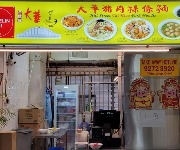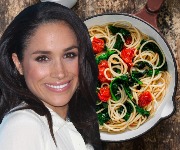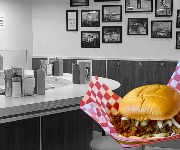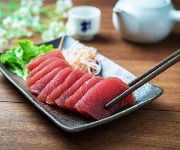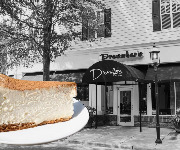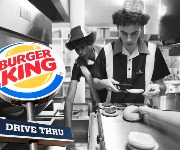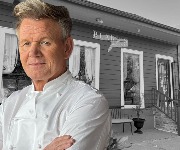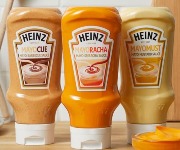My life in food: Ching-He Huang
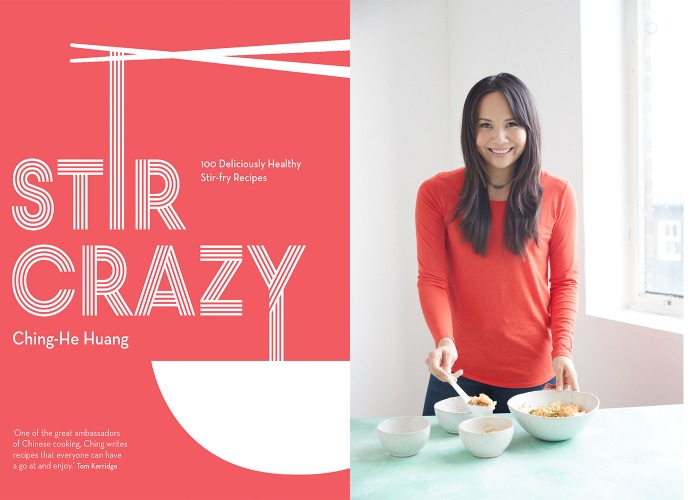
We spoke to the Taiwanese food writer and TV chef about growing up in different countries, why her favourite snack depends on where she is in the world and if Britain is ready for authentic Chinese food.
Chef and food writer Ching-He Huang has been at the helm of Chinese cooking in Britain for the last decade. She was born in Taiwan, raised in South Africa and moved to London where she launched a catering company before becoming one of the UK’s best-known TV chefs. Huang tells us about her childhood food memories, what inspires her in the kitchen and what piece of kitchen kit she couldn’t live without.
I didn’t grow up thinking I’d be a cook
I thought I’d work in medicine, really anything else than what I’m doing now. It was a series of events and influences that shaped me. My family have a bamboo farm on my maternal grandmother’s side and an orangery and a rice farm on my paternal grandparents’ side. I didn’t realise at the time how much being on a farm would influence me.
My mum was always an amazing cook. She made sure we were fed three good, nutritional meals a day by grabbing whatever she could from the fridge and turning it into something amazing. When we moved from Taiwan to South Africa and then London, I learned how she fused Chinese ingredients with Western ingredients.
 Ching-He Huang/Instagram
Ching-He Huang/Instagram
My favourite childhood memory is seeing my grandmother cooking
Everyone has something in their mind that they can’t bring back and for me, it’s watching my grandmother cooking at her wood-fired stove on her farm in Taiwan. She made amazing dumplings and bao. Every morning, she’d tell my grandfather what to go and get at the local market on his scooter.
Not knowing everything about food makes me want to be better
The more you do something, the more you become obsessed with the details and how you can do things differently. It’s really cool that in the last five years, everyone has become more open about food and experimenting.
When I started about ten years ago, people were quite stuck in their ways. Now you have this huge polarity with people who are obsessed with the classics and those who want to mash things up.
 Ching-He Huang/Instagram
Ching-He Huang/Instagram
I’m influenced by all sorts and that’s what makes food so magical
I love to travel, learn new things and cook with other chefs. I’m lucky that I get to meet a lot of people with varied tastes with the projects I’m involved with. It opens my mind.
You draw upon your own personal experience, travelling, your tastes, other people’s taste, and you go on to create something that’s unique. Sometimes I could just be sitting on a plane and look at the meal they serve and think ‘Could they have done this differently?’
There are two sides to my cooking personality
I love to learn the classics but I also love to innovate and do things differently. One of my friends told me this morning about making a vegan katsu with broccoli. Why should it always be chicken or pork? That’s what spurs me on.
I also love shortcuts. I think deep down, I’m quite a lazy cook! I just want to throw things together that taste amazing and are healthy, in the shortest time possible.
 Ching-He Huang/Instagram
Ching-He Huang/Instagram
I’m asked all the time whether the Western palate is geared up for the real taste of China
It’s incredible what we’ve gone through in the last ten years. When I started cooking, we couldn’t get Shaoshing rice wine in the supermarkets and was told that I couldn’t have it as an ingredient because it wasn’t widely available. Now, it’s everywhere.
When people ask if the Western palate is ready for the real taste of China, I say, “Well, how strong is the West’s love affair with offal?” Offal is something we eat all the time so I think if the West increase their love for it, there’s not a problem.
We also love obscure tastes which we ourselves call ‘obscure’ in China. In Sichuan, there’s a taste which is literally called ‘strange’. It’s this mix of sweet, sour, bitter, salty, pungent, aromatic – everything thrown together. People love it. For now in the West, it’s still about populist, safe tastes as opposed to the ‘strange’ tastes.
 Ching-He Huang/Instagram
Ching-He Huang/Instagram
Five final questions
Favourite snack: If I’m in Taiwan, my mum’s pineapple cake. If I’m in London, salt and vinegar Chipsticks crisps or pickled onion Monster Munch. If I’m in Hong Kong, walnut cookies.
Essential kitchen kit: It has to be the wok.
Most well-thumbed cookbook: If I had to choose one, it would be Eileen Yin-Fei Lo’s The Chinese Kitchen which is on Cantonese cuisine. When I was on this road to cooking, someone gave it to me and I learned a lot.
Go-to midweek meal: It has to be a stir-fry but not an ordinary stir-fry. A stir-fry that’s turned into a braised dish or a curry or congee.
Pearl of wisdom cooking advice: Practice makes perfect, keep going with a particular style of cuisine or dish that you enjoy and then you will master it. Once you do that, it will give you the confidence to do much more.
Ching-He Huang’s new book Stir Crazy, published by Kyle Books, is out now.
This interview has been edited and condensed for length and clarity.
You might also enjoy:
Ching-He Huang's char sui pork with pak choy
Dave Coulson: meet Newcastle's MasterChef
Sabrina Ghayour: the new superstar of Middle Eastern cuisine
Most Recent
Comments
Be the first to comment
Do you want to comment on this article? You need to be signed in for this feature
